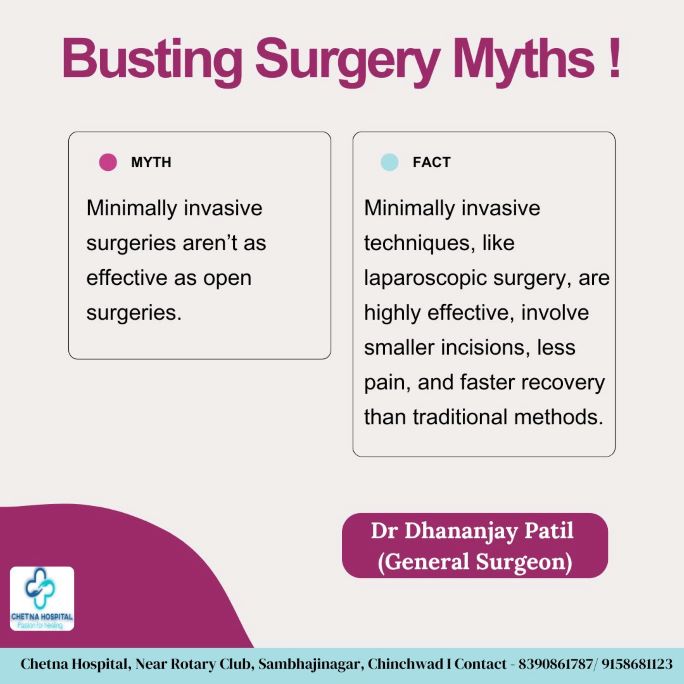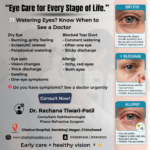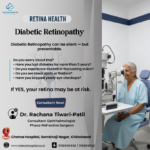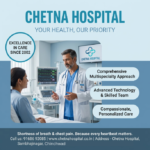Surgery often brings with it a mix of emotions—fear, uncertainty, and even confusion. While advancements in medical science have made surgeries safer and more effective, many people still hold onto misconceptions that can create unnecessary anxiety. Let’s separate fact from fiction by debunking some of the most common myths about surgery.
Myth 1: Surgery is always the last resort.
Fact:
Surgery is not always a measure of last resort. While non-surgical treatments like medications or physical therapy are often the first line of care, some conditions require timely surgical intervention for effective treatment. For example, delaying surgery for a hernia or appendicitis can lead to complications that could have been avoided with earlier treatment. Surgeons carefully assess each patient to recommend surgery only when necessary and beneficial.
Myth 2: Minimally invasive surgeries aren’t as effective as open surgeries.
Fact:
Minimally invasive techniques, such as laparoscopic and robotic surgeries, are not only effective but also come with several advantages. These procedures involve smaller incisions, which result in less pain, reduced risk of infection, and faster recovery times. For many procedures, including gallbladder removal or hernia repair, minimally invasive methods are now considered the gold standard.
Myth 3: You can’t eat or drink for 24 hours after surgery.
Fact:
While it’s true that patients are usually asked to fast before surgery, the post-operative guidelines depend on the type of surgery performed. For most procedures, patients can consume liquids within a few hours and gradually return to normal eating habits as advised by their healthcare team. Prolonged fasting after surgery is typically unnecessary unless specified for medical reasons.
Myth 4: General anesthesia is risky and can lead to complications.
Fact:
Modern anesthesia is highly safe, with complications being extremely rare. Advances in anesthetic drugs and monitoring technology ensure that patients’ vital signs are closely observed throughout the procedure. An experienced anesthesiologist assesses the patient’s medical history and condition to minimize risks and ensure safety.
Myth 5: Surgery scars never fade completely.
Fact:
While scars are a natural part of healing, proper post-operative care can significantly improve their appearance over time. Following your surgeon’s advice, such as using prescribed creams or silicone sheets, can help scars fade. Moreover, newer surgical techniques and advanced sutures are designed to minimize scarring from the outset.
Myth 6: Surgery is always painful.
Fact:
Pain management is a priority in modern surgical care. With advanced anesthetic techniques and effective painkillers, most patients experience minimal discomfort during and after the procedure. Surgeons also provide personalized pain management plans to ensure a comfortable recovery.
Myth 7: Young, healthy individuals don’t need surgery.
Fact:
Age and general health do not make one immune to conditions that require surgery. For instance, appendicitis, gallstones, or sports injuries may affect young and seemingly healthy individuals. Timely surgical intervention prevents complications and ensures a quick recovery.
Myth 8: Surgery recovery takes months.
Fact:
Thanks to technological advancements and minimally invasive techniques, recovery times have significantly decreased. Many patients can resume normal activities within days or weeks, depending on the type of surgery. Following post-operative instructions and attending follow-up appointments are key to a smooth recovery.
Myth 9: Any surgeon can perform all types of surgeries.
Fact:
Surgeons often specialize in specific fields, such as general surgery, orthopedic surgery, or cardiovascular surgery. Each specialty requires additional training and expertise. For instance, a general surgeon is skilled in procedures like hernia repair, appendectomies, and gallbladder surgeries. Consulting the right specialist ensures the best possible outcomes.
Myth 10: Robotic surgery means a robot performs the procedure without human involvement.
Fact:
Robotic-assisted surgery is performed by a highly trained surgeon who controls the robotic instruments. The technology allows for greater precision and flexibility, enabling surgeons to perform complex procedures with enhanced accuracy. The robot acts as a tool, not a replacement for the surgeon.
Overcoming the Fear of Surgery
Understanding the facts about surgery is the first step toward overcoming fear. It’s normal to feel apprehensive, but discussing your concerns openly with your surgeon can alleviate doubts. Surgeons prioritize patient education, ensuring you feel confident and well-prepared.
How to Prepare for Surgery
If you’ve been advised to undergo surgery, here are some tips to help you prepare:
- Understand the Procedure: Ask your surgeon about the process, risks, benefits, and recovery.
- Follow Pre-Surgery Guidelines: This may include fasting or stopping certain medications.
- Arrange Post-Surgery Care: Plan for transportation, rest, and assistance during recovery.
- Stay Positive: Trust your medical team and focus on the benefits the surgery will bring.
Trust the Experts
At Chetna Multispeciality Hospital, we believe in empowering patients with the right knowledge. Under the expertise of Dr. Dhananjay Patil, General Surgeon, we ensure each patient receives personalized care and clear guidance at every step. Our state-of-the-art facilities and advanced surgical techniques make procedures safe, effective, and stress-free.
For Consultation Contact us on 8390861787 / 9158681123
Website – www.chetnahospital.co.in
Address – Chetna Hospital, Sambhajinagar, MIDC, G Block, Near Rotary Club, Chinchwad 411019
.
.
.
#pune#pcmc#chinchwad#hospital#medical#medicalservices#health#healthcare#surgery#generalsurgery#medicalprocedure#generalsurgeon#generalsurgeoninchinchwad













